
“A Piece of My Mind”
April 2018 Newsletter
Advancing Christian Faith and Values,
Defending Religious Liberty for All,
Supporting Civility and the Common Good
through Preaching, Teaching, Writing, Activism and Reasoned Conversations


Bible Insight for
Good Friday & Easter—
“How is God
‘The Savior of all’?”
Martin Luther King, Jr.
(1929 – April 4, 1968)
Billy Graham
(1918 – February 21, 2018)
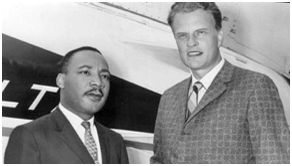
Bible Insight – How is God “The Savior of all”?
Easter Season is a good time to ponder an interesting scripture.
“The saying is trustworthy and deserving of full acceptance. For to this end we toil and strive, because we have our hope set on the living God, who is the Savior of all people, especially of those who believe.” – 1 Timothy 4:9-10 ESV
The Christian tradition I know puts great emphasis on how God saves all who believe in Jesus. It’s as clear as the best-known verse of the Bible (John 3:16):
“For God so loved the world, that he gave his only Son, that whoever believes in him should not perish but have eternal life.” This salvation is procured through Jesus’ death on the cross (the Good Friday message) and proclaimed and validated through his resurrection (the Easter message).
But the Apostle Paul writes that there is more to God’s saving work than that, as important as it is. In some sense, God is savior of all.
Let’s call this sense “The Savior—Basic Version.” John 3:16, then, gives us “The Savior—Enhanced Version.”
In what sense does God save everyone? At the start, we reject universal salvation from sin (eternal life for all) as being as thoroughly unbiblical as it is appealing to our emotions. It just isn’t “there” as numerous Bible verses indicate (Daniel 12:2-3; John 5:28-29; Romans 6:23 among many others).
My New Testament professor in seminary, Dr. Homer A. Kent, Jr., gave an explanation to 1 Timothy 4:9-10 in his book The Pastoral Epistles that still sounds reasonable to me.
“As applied to unbelievers [God’s salvation] includes preservation and deliverance from various evils and the bestowal of many blessings during this life. To believers, however, this salvation does not end with earthly life but goes on for all eternity.”
Similarly, the reformer John Calvin said this “salvation for all” refers to God’s kindness and goodness to everyone. We call this the working of “common grace” whereby God cares for all people with numerous blessings from creation and providence, and from the social institutions God establishes. *
In my article on “common grace” I identify several blessings from God to all:
• Creation—its abundance, variation and beauty
• The value and dignity of human life by virtue of its special creation
• A basic sense of right and wrong instilled in all of us
• Human intelligence, creativity, artistry, achievements, enjoyments
• The family
• Human government (be it ever so open to frailty and wrong) that promotes justice, punishes evil, encourages good, and secures peace
• Restraint of evil, lest the world become even more intolerable and ungovernable than it already seems.
With these thoughts in mind, I encourage every church to teach and every Christian to practice both evangelism (sharing the message of forgiveness through Jesus) and social activism (supporting all in secular life that is for the common good). Through us, then, God mediates the ministry of salvation to all people, and especially to those who believe.
* John Calvin’s Commentary on 1 Timothy. See my article on “Common Grace” in my November 2015 Newsletter: http://donaldshoemakerministries.com/blog/614/
Remembering Martin Luther King, Jr. and Billy Graham
 It’s hard for me to imagine evangelical Christianity without Billy Graham. And April 4 marks 50 years since Martin Luther King was assassinated. If we remember this event, we remember where we were when we heard it (like the death of John F. Kennedy or “9/11”).
It’s hard for me to imagine evangelical Christianity without Billy Graham. And April 4 marks 50 years since Martin Luther King was assassinated. If we remember this event, we remember where we were when we heard it (like the death of John F. Kennedy or “9/11”).
Billy Graham’s ministry blossomed from a prayer meeting held in the Rainbow Room of the Westminster Hotel in Winona Lake, Indiana on July 13, 1949. While a student in seminary, I was a hotel clerk working next to the Rainbow Room when I learned of the King assassination.
Both men affected the country and world for the better in their unique ways. King was the activist preacher who took to the streets and elsewhere, breaking unjust laws when necessary to further the just cause. Graham was the preacher calling for a change of heart, but he put his faith to work by insisting on (even enforcing) desegregation of his early evangelistic meetings.
I think both roles are necessary. I also think God calls some to work within the “system” (such as how the Bible’s Nehemiah and Daniel served in secular government) and minister within it as they can. And God calls others to stand outside the “system” and prophesy against it when necessary (as Elijah, John the Baptist and Jesus did).
One of Martin Luther King’s contributions was to articulate when civil disobedience may be justified. It is permissible to resist an “unjust” law—a law that does not accord with the moral law of God.
Billy Graham was a pastor to presidents among his many roles. Early on, he ministered to politicians while staying aloof from politics. Quite a feat, and he confessed some failures along the way.
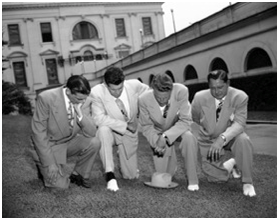 For example, a young Billy Graham, naïve about politics and protocol, once met with President Truman at the White House. Then he went outside and “spilled the beans” about the meeting to reporters. Worse, he took their bait and knelt on the White House lawn to pray for the president. (Hard to imagine, isn’t it? The news media baiting people so they can get a story!)
For example, a young Billy Graham, naïve about politics and protocol, once met with President Truman at the White House. Then he went outside and “spilled the beans” about the meeting to reporters. Worse, he took their bait and knelt on the White House lawn to pray for the president. (Hard to imagine, isn’t it? The news media baiting people so they can get a story!)
Billy Graham deeply regretted this incident, as he recalled it in his autobiography Just As I Am. Unfortunately it hurt his witness to Truman, who regarded him as a counterfeit and persona non grata at the White House. Many years later the two were able to laugh together about it.
I saw Billy Graham four times in my life (1961 at a Youth For Christ gathering in Chicago, 1969 at a Youth for Christ national gathering in Winona Lake, and at the Crystal Cathedral and Anaheim Crusade in 1985). I saw Martin Luther King once at a Baptist church in my hometown of Mansfield, Ohio.
I cherish the memory and work of both—the world is much better off because of them.
Recommended: Just as I Am by Billy Graham; The Autobiography of Martin Luther King, Jr. and Letter from Birmingham Jail by Martin Luther King; Christianity Today “Billy Graham Issue” – read this issue at: www.christianitytoday.com/ct/2018/billy-graham
“Our Thoughts and Prayers are with you.” So?
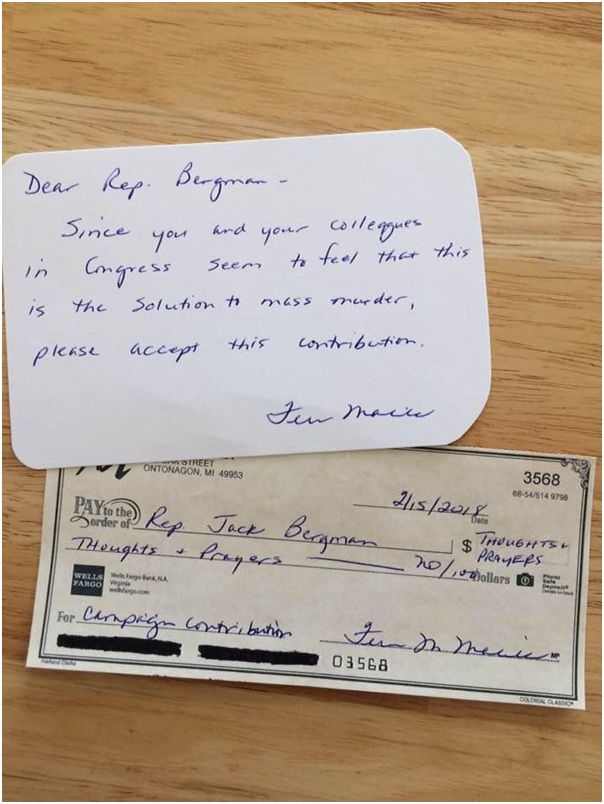
This expression has been harshly criticized as utterly inadequate in light of the school shooting in Parkland, Florida. What should we say about it?
It can be phony and insincere—a platitude we use to move past a situation and then forget about it.
It can be well intentioned but then we fail to follow through on our promise. We fail to pray for those in need as we promised we would. Let’s confess how often we’ve promised to pray for someone and then failed to do so.
It can be a limitation we wrongly impose on our response to evil and tragedy. We think once we have “thought and prayed” we’ve done our job. While some critics of this phrase do so because they don’t believe in prayer or doubt the sincerity of those who say this, we must recognized that some victims don’t believe we really intend to do anything other than “think and pray.” In this, they make a strong point.
One of my favorite Bible verses: hearing the threats against his people as the walls of Jerusalem were being rebuilt, Nehemiah, governor of the region at the appointment of the Persian king, told what actions he was taking.
“We prayed to our God and posted a guard day and night to meet this threat” (Nehemiah 4:9 in context). The people prayed; the people took action.
Prayer, if genuine, will always include commitment to do what one can and should do to lift a burden or prevent more harm or injustice. *
Faith without works is dead. “Suppose a brother or a sister is without clothes and daily food. If one of you says to them, ‘Go in peace; keep warm and well fed,’ [‘I’ll keep you in my thoughts and prayers.’] but does nothing about their physical needs, what good is it?” (James 2:15-16).
So let’s weigh our intentions and follow through with our promises. Let’s supplement prayer with action as needed. And let’s temper our criticism of others when they speak this phrase with sincerity.
* The neighbor of the church in Sutherland, Texas put “thoughts and prayers” to action when he took his AR-15 rifle and engaged the shooter/murderer outside the church.
Civility, please. Please!
My wife and I were on a plane from L.A. to Washington, D.C. last November.
I couldn’t see the computer screen belonging to the passenger right in front of me. But my wife could see it and so could most passengers around us.
The screen said boldly, “F * * * T R U M P”, no letters left to the imagination!
This is one manifestation of a growing trend toward incivility in our country. Little consideration of those around you. Little proper regard for those in authority, whether you agree with them or not, or for adversaries.
Civility is our ability to look past differences and listen to the viewpoints of others. Civil people can disagree without disrespect. Without this, the dialogue needed for successful democratic government is impossible.
I believe civility is the natural outcome of belief that we are made in the likeness of God. We must not bless God and then curse people, for they bear his likeness (James 3:9-10). OK, we are all broken humans and sometimes we have to squint a bit to see dignity in others. And we may not see it well in the mirror either. But that dignity remains, regardless our shortcomings.
Government is a gift from God and rulers are to be honored in spite of their imperfections. We are to pray for them, so their rule will be just and peace inducing (1 Peter 2:13-17; 1 Timothy 2:1-2).
Government leaders should make this respect easier to offer and not harder. From the President on down, there should be no place for ad hominem comments that diminish others, including degrading tweets.
Without knowing of the foul message on this passenger’s computer screen,
I helped her get her bag down when we reached D.C. Knowing what I know now, what should I have done? Well, the same thing. “Do good to those who hate you, bless those who curse you, pray for those who mistreat you… Do to others as you would have them do to you” – Jesus (Luke 6:27-31).
See my full statement on Civility at: http://donaldshoemakerministries.com/blog/essential-civility/
A Scripture on the Power and Practicality of Jesus’ Resurrection
We were buried therefore with [Jesus] by baptism into death,
in order that, just as Christ was raised from the dead
by the glory of the Father, we too might walk in newness of life. For if we have been united with him in a death like his,
we shall certainly be united with him in a resurrection like his.
We know that our old self was crucified with him
in order that the body of sin might be brought to nothing,
so that we would no longer be enslaved to sin.
For one who has died has been set free from sin.
Now if we have died with Christ,
we believe that we will also live with him.
We know that Christ, being raised from the dead,
will never die again; death no longer has dominion over him.
For the death he died he died to sin, once for all,
but the life he lives he lives to God.
So you also must consider yourselves dead to sin
and alive to God in Christ Jesus.
Let not sin therefore reign in your mortal body,
to make you obey its passions.
Do not present your members to sin
as instruments for unrighteousness,
but present yourselves to God
as those who have been brought from death to life,
and your members to God as instruments for righteousness.
– Romans 6:4-13 (New International Version)
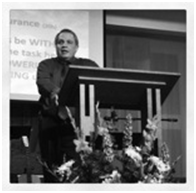 Don’s Upcoming Ministries
Don’s Upcoming Ministries
May 13 (Mother’s Day) – Speak in morning worship services (8:00, 9:30, 11:00) at Grace Community Church of Seal Beach on the Book of Ruth, chapter 2.
May 15 & 18 – Teach on The Epistle to Philemon at Women Bible Study, Grace Community Church of Seal Beach (6:30 pm on Tuesday, May 15 and 9:30 am on Friday, May 18).
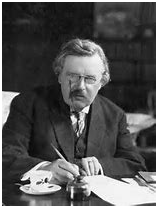 “We do not want a church that will move with the world. We want a church that will move the world.”
“We do not want a church that will move with the world. We want a church that will move the world.”
– G. K. Chesterton (1874-1936)
English writer, philosopher, orator,
lay theologian and more
My Website: www.donaldshoemakerministries.com
Contact me at: donaldshoemakerministries@verizon.net</>

